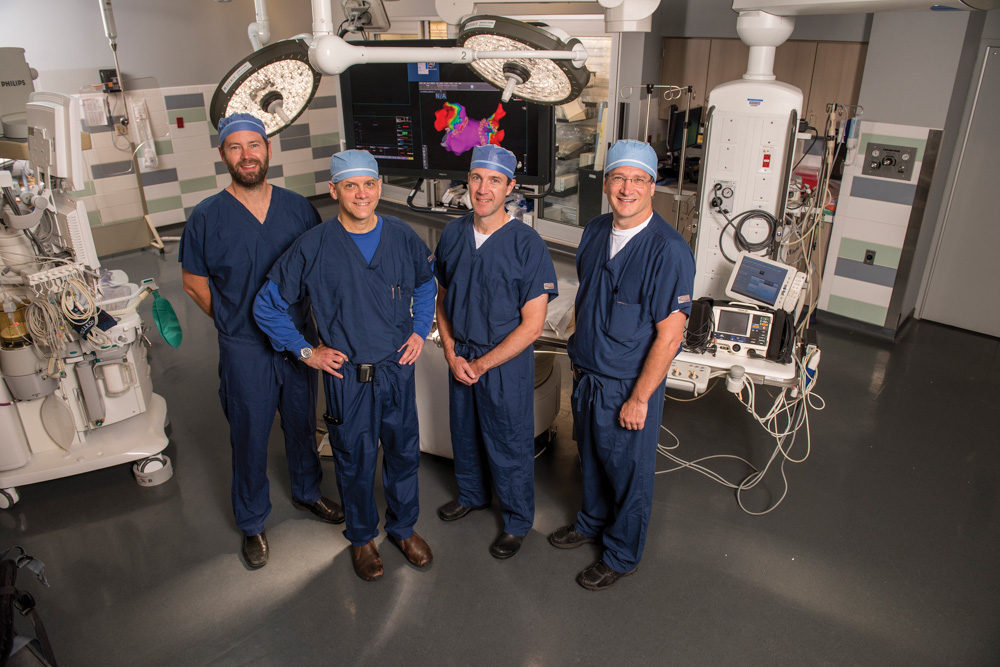Atrial fibrillation affects more than seven million Americans, and that number is projected to increase dramatically over the next 25 years. AFib, as it is commonly called, is a rapid and irregular heart rhythm that arises from chaotic and irregular electrical activity in the upper chambers of the heart. Normal electrical activity is about 50-100 beats per minute; when the heart is in AFib, the irregular rates can be as high as 200 per minute, reports Karl Ilg, MD, Genesys Heart Institute Electrophysiologist.
“If the heart rate is left at a rapid rate for prolonged periods, the heart muscle weakens, leading to symptoms of congestive heart failure,” Ilg points out. “People with AFib are at a greater risk of stroke than those who do not have this heart condition.”
Many people with AFib have exhausted all treatment options to help correct it. But, thanks to a new procedure – offered only at Genesys – these patients now have renewed hope.
The Convergent procedure, specifically, is for people who have persistent AFib and have not had success with other treatments, or have little chance of success with conventional techniques. This new technique combines the skills of a cardiothoracic surgeon and an electrophysiologist who work as a team to restore normal heart rhythm.
Here is how it works:
The cardiothoracic surgeon and the electrophysiologist identify and eliminate areas of the right and left chambers of the heart that are responsible for initiating and maintaining abnormal rhythm. They use instrumentation that heats areas of heart tissue. First, the cardiothoracic surgeon makes three tiny incisions in the patient’s abdomen and works through these special instruments to create a lesion pattern around the outside of the heart. Next, the electrophysiologist completes the procedure by inserting small, flexible catheters through the groin to target areas the cardiothoracic surgeon cannot access from outside the heart.
The procedure takes about five hours and is conducted in a specialized cardiac catheterization lab at Genesys that features the newest generation of technology to conduct advanced procedures and complex cases that previously were referred out of the region, and with Convergent, out of the state. Following the procedure, a typical hospital stay is two to three days, with a return to normal activities in about two weeks.
Genesys Heart Institute’s Convergent team includes: cardiothoracic surgeons Karsten Fliegner, MD, PhD, FACS; Marc Silver, MD, FACS; and electrophysiologists Matthew Ebinger, DO; and Karl Ilg, MD. Patients first are seen through the Genesys Atrial Fibrillation Clinic where electrophysiologists evaluate each individual and determine the best course of treatment.
Factors that can lead to AFib are age, heart valve disease, hypertension, congestive heart failure, coronary artery disease, obesity and obstructive sleep apnea. This new technique combines the skills of a cardiothoracic surgeon and an electrophysiologist who work as a team to restore normal heart rhythm..
(L-R) the convergent team includes Karl Ilg, MD; Karsten Fliegner, MD;
Matthew Ebinger, DO
and Marc Silver, MD.
Genesys conducts AFib procedures without the use of radiation
Genesys Heart Institute electrophysiologists also obtained extensive training to conduct atrial fibrillation procedures without the use of radiation. They have mastered an advanced technique in the use of intracardiac echo (ultrasound) and a computer-based 3D mapping system that eliminates radiation exposure. This is a huge benefit for patients, Dr. Ilg reports, because a traditional AFib procedure exposes the patient to the equivalent of several chest X-rays, which can be concerning to younger patients and those with a high risk of cancer.










